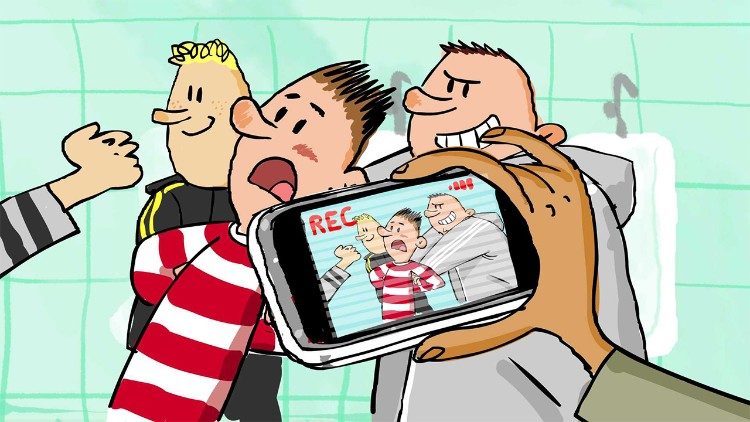
The First International Day against Violence and Bullying at School including Cyberbullying is being marked on Thursday. UNESCO – the United Nations Educational, Scientific and Cultural Organization – established the annual day at its 40th General Conference in November 2019, recognizing that bullying in schools and cyberbullying is an infringement of children’s and adolescents’ rights to education and to health and well-being.
The day will be observed on the first Thursday of November each year. The theme this year is “Together against Bullying in school”.
A widespread phenomenon
According to UNESCO’s recent report “Behind the numbers: ending school violence and bullying” (2019), more than 30% of the world’s students have been victims of bullying.
Almost one in three students has been bullied by their peers at school at least once in the last month and a similar proportion were affected by physical violence. School violence and bullying is mostly perpetrated by peers but, in some cases, also by teachers and other school staff. Corporal punishment is still allowed in schools in 67 countries.
Consequences
There are significant negative effects of the violence, including on academic achievement, mental health, and quality of life in general. Students who are frequently bullied are nearly three times more likely to feel like an outsider at school and more than twice as likely to miss school as those who are not frequently bullied.
Victims of bullying have worse educational records and are also more likely to leave formal education after finishing secondary school. They are twice as likely to feel lonely, to be unable to sleep at night, and to have contemplated suicide. A study conducted in 77 countries showed the negative impact of bullying on girls’ performance in maths and science tests.
Who are the victims?
According to UNESCO, physical appearance is the top reason for bullying, followed by ethnicity, nationality and the colour of one’s skin. Students who are seen as “different” in any way are more at risk of being bullied, such as girls perceived to look or act like boys, or boys perceived to look or act like girls.
Cyberbullying
In a message for the international day, UNESCO Director-General Audrey Azoulay UNESCO noted that one in ten students has been cyberbullied, adding that this form of bullying is on the rise in the wake of the COVID-19 pandemic.
According to data from seven European countries, the proportion of children aged 11 to 16 who have fallen victim to cyberbullying increased from 7% to 12% between 2010 and 2014. Cyberbullying may take place in a “virtual” world, Azoulay said, but it has a very real impact on children’s health. “Beyond the numbers, there are tragic stories, educations ruined, and lives sometimes permanently ripped apart.”
Too many people think bullying at school including cyberbullying is an inevitable rite of passage to adulthood and that is relatively harmless and one can do little to stop it. Instead, there is strong evidence that violence and bullying at school including cyberbullying can be prevented and effectively addressed if it happens.
Azoulay hoped that the international day will build global awareness about the scale of the problem and of the need to put an end to bullying and cyberbullying as soon as possible. “As students, parents, members of the educational community and ordinary citizens, we have all a part to play in stopping violence and bullying in schools,” she urged.
Pope Francis on bullying
Pope Francis, who has been an ardent advocate of healthy and quality education for all young people, has addressed the issue of bullying on several occasions. He lamented that “bullying is an ‘air’ that our children often breathe”. “The remedy is to make them breathe a different air, a healthier and more human one. That’s why an alliance with the parents is very important.”
During his meeting with young people in Tokyo, Japan, in November 2019, he spoke at length about bullying. Responding to a question by a bully victim, a Filipino, the Holy Father said a bully tries to escape his own fear. “The cruellest thing about bullying,” he said, “is that it attacks our self-confidence at the very time when we most need the ability to accept ourselves and to confront new challenges in life.” “Sometimes, victims of bullying even blame themselves for being ‘easy’ targets” and can even “end up in very tragic situations”.
Bullies are in fact weak and fearful
“Yet paradoxically,” he noted, “it is the bullies … who are the truly weak ones” because “deep down, bullies are afraid, and they cover their fear by a show of strength.” The Pope said a bully is always fearful and fear is always the enemy of goodness, and so it is the enemy of love and peace. All religions, he said, “teach tolerance, teach harmony, teach mercy; religions do not teach fear, division and conflict”.
He thus urged young people to join hands in fighting bullying, saying, “There is no greater weapon against these actions than standing up in the midst of our classmates and friends and saying: ‘What you are doing – bullying – is wrong.’”
Source: Vatican News





